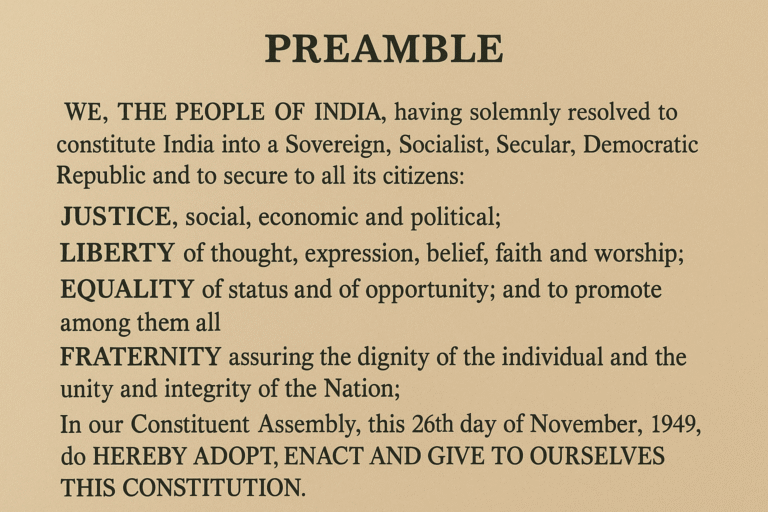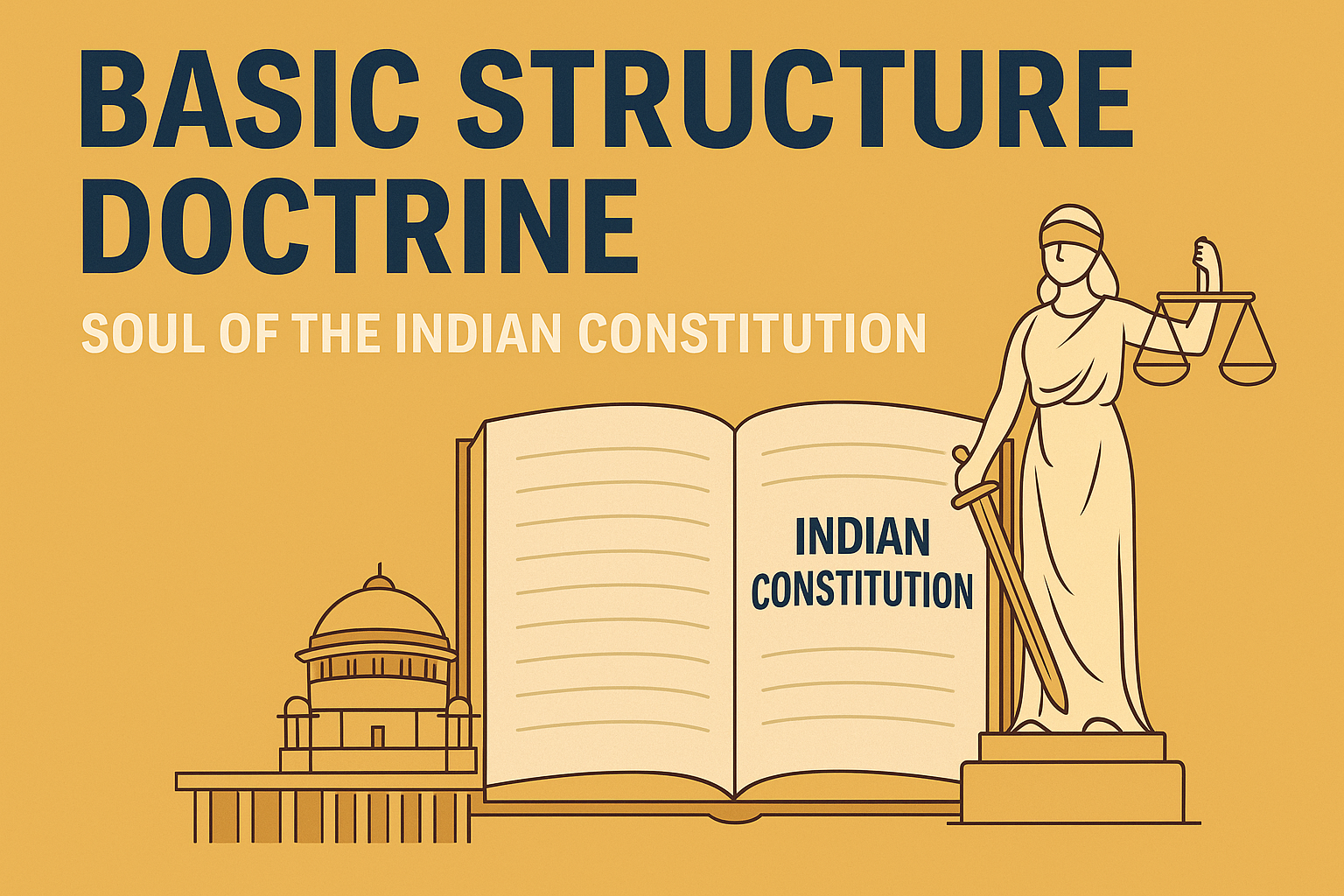🇮🇳 Part 2 – Citizenship
➤ What is Citizenship? (NCERT)
Citizenship is the legal membership of a person in a state.
It enables a person to enjoy full civil and political rights, and places duties and responsibilities on the individual.
From the Indian perspective:
- It establishes a legal bond between the individual and the Indian state.
- It is governed by the Constitution (Articles 5–11) and the Citizenship Act, 1955.
➤ Citizens vs Aliens (NCERT):
| Category | Meaning in NCERT |
|---|---|
| Citizen | Full membership of the political community; enjoys all fundamental rights. |
| Alien | A foreigner; does not enjoy political rights like voting. |
| Illegal Migrant | A foreigner who enters India without valid documents or stays beyond the permitted time. |
🎯 Why Articles 5 to 11?
The Constitution of India came into effect on 26 January 1950.
Articles 5 to 11 deal with citizenship at the time of commencement of the Constitution.
✅ These are transitional provisions.
❌ They do not deal with citizenship after 26 January 1950 — that is handled by the Citizenship Act, 1955 (under Article 11).
📘 ARTICLE-WISE EXPLANATION
🗂️ Article 5 – Citizenship at the Commencement
“Every person who had domicile in India and fulfilled any of the following was a citizen on 26 Jan 1950:”
Three Conditions (ANY ONE needed):
- Born in India, or
- Either parent born in India, or
- Ordinarily resident in India for 5 years before 26 Jan 1950
🧠 Trick: D + BPO
(Domicile + Born / Parent / Ordinarily resident)
🗂️ Article 6 – Citizenship of Migrants from Pakistan to India
Special provisions for those who migrated from Pakistan to India before and after 19 July 1948:
| Migration Time | Citizenship Condition |
|---|---|
| Before 19 July 1948 | Residing in India = Indian citizen |
| After 19 July 1948 | Needed to be registered + valid permit |
🧠 Trick: “After July = Apply!”
(After 19 July = Register)
🗂️ Article 7 – Migrants to Pakistan (but returned)
If a person migrated to Pakistan after 1 March 1947, then:
- ❌ Not a citizen of India
- ✅ Unless they returned to India under permit and were registered
🧠 Trick: “Gone to Pak = Gone!”
(Return only with permission)
🗂️ Article 8 – Indians Living Abroad
If a person:
- Was born in India (or parents/grandparents were), and
- Lived outside India, but
- Registered with Indian consulate
➡️ They were entitled to Indian citizenship.
🧠 Trick: “PIO + Registration = Citizen Abroad”
🗂️ Article 9 – Foreign Citizenship Clause
If a person voluntarily acquired the citizenship of another country,
➡️ ❌ They ceased to be a citizen of India.
🧠 Trick: “Foreign tag = Indian flag gone!”
🗂️ Article 10 – Continuance of Citizenship
Any person who became citizen under Articles 5–8 shall continue to be a citizen, subject to future laws by Parliament.
🧠 Think of this as the “safeguard clause”.
🗂️ Article 11 – Power of Parliament
Parliament can make laws related to acquisition, termination, and related aspects of citizenship.
✅ This is the basis of the Citizenship Act, 1955.
🧠 Trick: “Final call to Parliament’s hall.”
(Based on NCERT Chapter 2: Rights in the Indian Constitution)
| Article | Title | What it Means (NCERT Context) |
|---|---|---|
| Art 5 | Citizenship at the commencement | Anyone domiciled in India and fulfilling certain birth/residence conditions became an Indian citizen on Jan 26, 1950. |
| Art 6 | Rights of migrants from Pakistan | Two categories of migrants: before & after July 19, 1948; different rules apply for citizenship. |
| Art 7 | People migrating to Pakistan but returning | They were not automatically granted citizenship—had to be registered under a special permit. |
| Art 8 | Indians abroad | People of Indian origin settled abroad could register as citizens at Indian embassies. |
| Art 9 | Foreign citizenship | Voluntarily acquiring foreign citizenship = loss of Indian citizenship. |
| Art 10 | Continuation of citizenship | Citizens under Art. 5–9 will continue as citizens unless Parliament says otherwise. |
| Art 11 | Power of Parliament | Parliament can legislate on matters of citizenship. (Enabling provision for the Citizenship Act, 1955.) |
🔍 Note: These articles were transitional and were used for initial classification post-independence.
Citizenship Act, 1955
This Act—passed under Article 11—deals with:
- Acquisition of citizenship after 1950
- Loss of citizenship
- Overseas Citizenship, NRC, and related provisions
This law provides five ways to acquire, and three ways to lose Indian citizenship.
🔹 Acquisition of Citizenship (Section 3–7)
| Method | Details |
|---|---|
| By Birth | – Born in India: ✔️ Before 1987: citizen by birth ✔️ 1987–2003: one parent must be Indian ✔️ After 2003: one parent Indian & other not an illegal migrant |
| By Descent | Born outside India to at least one Indian citizen parent (specific rules apply after 2004). |
| By Registration | Persons of Indian origin, or spouses of Indian citizens, etc., can apply for citizenship. |
| By Naturalisation | After staying in India for 11 out of last 14 years (and 12 months immediately before application). |
| By Incorporation of Territory | If any foreign territory becomes part of India, its people become citizens. (E.g., Goa 1961) |
🔹 Loss of Citizenship
| Mode | What Happens |
|---|---|
| Renunciation | Voluntary action of giving up citizenship. |
| Termination | Acquiring foreign citizenship automatically ends Indian citizenship. |
| Deprivation | Government can cancel citizenship if obtained by fraud, or for showing disloyalty, etc. |
Citizenship by Birth
📘 Source: NCERT (Class 11 – Indian Constitution at Work) + Citizenship Act, 1955
✅ What is Citizenship by Birth?
As per Section 3 of the Citizenship Act, a person born in India is a citizen if certain conditions are met.
India used to follow the jus soli (right of soil) principle but has now adopted a restricted form due to illegal migration concerns.
🧾 PHASE-WISE EVOLUTION
📌 PHASE 1: (26 Jan 1950 – 1 July 1987)
- ✅ If a person was born in India in this period → Automatically a citizen of India.
- ❌ No condition on parent’s citizenship.
- 📌 Pure jus soli (by soil).
🔑 Memory Trick:
💡 “87 was still heaven – you were Indian by birth alone!”
📌 PHASE 2: (1 July 1987 – 3 December 2004)
- ✅ Person born in India + at least one parent must be an Indian citizen.
- ❌ If both parents are foreigners → ❌ Not a citizen.
- 📌 Partial jus soli.
🔑 Memory Trick:
💡 “One parent is fine till 2004’s end-time!”
📌 PHASE 3: (After 3 December 2004)
- ✅ Person born in India AND
🔹 Both parents are Indian citizens, OR
🔹 One parent is a citizen & the other is NOT an illegal migrant. - ❌ If either parent is an illegal migrant → ❌ Not eligible.
🔑 Memory Trick:
💡 “In 2004, doors got closed—now check both parents’ codes!”
📌 Definition of “Illegal Migrant”
As per Section 2(1)(b), a person who:
- Enters India without valid documents, OR
- Stays beyond the permitted time
Is called an illegal migrant and is not eligible for citizenship—even for their child born in India.
📊 Table: Summary for Quick Revision
| 📅 Period | ✅ Condition for Citizenship |
|---|---|
| 26 Jan 1950 – 1 July 1987 | Born in India = Citizen (no parent condition) |
| 1 July 1987 – 3 Dec 2004 | One parent must be an Indian citizen |
| After 3 Dec 2004 | Both parents citizens OR one citizen + one not illegal migrant |
🔍 UPSC Prelims MCQ Types
- A child born in India in 1986 to foreign parents is:
✅ Citizen - A child born in 2000 with one Indian parent and one foreigner is:
✅ Citizen - A child born in 2005, one parent is Indian, the other is illegal migrant:
❌ Not a citizen
Citizenship by Descent – UPSC Notes
📘 Based on: Citizenship Act, 1955 – Section 4 + NCERT Class 11 (Indian Constitution at Work)
🔍 Descent = Citizenship through Parents (when the child is born outside India)
📖 What is “Descent”?
When a person is born outside India, but at least one parent is an Indian citizen, they may acquire Indian citizenship by descent—not by soil, but by bloodline.
This follows the jus sanguinis principle (right of blood).
📆 Time-Based Rules under Section 4
📌 PHASE 1: Born Outside India – Between 26 Jan 1950 and 9 Dec 1992
- ✅ Child is an Indian citizen if the father was an Indian citizen at the time of birth.
- ❌ Mother’s citizenship not considered during this period.
🧠 Memory Trick:
“From 1950 till 1992, father made you desi too!”
📌 PHASE 2: Born Between 10 Dec 1992 – 2 Dec 2004
- ✅ Child is an Indian citizen if either parent (mother or father) is an Indian citizen.
- 👨👩🦱 Equal treatment begins for both parents.
🧠 Memory Trick:
“1992 gave equal view — mom or dad, both will do!”
📌 PHASE 3: Born On or After 3 Dec 2004
- ✅ Child is an Indian citizen if:
- Either parent is an Indian citizen,
AND - The birth is registered at the Indian consulate within 1 year (or with special permission after 1 year).
- Either parent is an Indian citizen,
🧠 Memory Trick:
“After 2004, don’t ignore — Register to open India’s door!”
📌 Conditions for Citizenship by Descent (Post-2004)
| Criteria | Mandatory? |
|---|---|
| Born outside India | ✅ Yes |
| One parent must be Indian citizen | ✅ Yes |
| Registration at Indian consulate | ✅ Yes (within 1 year of birth) |
📊 Quick Comparison Table
| Period | Citizenship Rule |
|---|---|
| 26 Jan 1950 – 9 Dec 1992 | Father Indian = Citizen |
| 10 Dec 1992 – 2 Dec 2004 | Either parent Indian = Citizen |
| After 3 Dec 2004 | Either parent Indian + Registration required |
📚 NCERT-Style Concept
- Citizenship by descent applies only to those born outside India.
- Shifted from paternal bias (1950–1992) → gender equality (1992–2004) → stricter rules post-2004 due to global migration concerns.
💡 Frequently Asked UPSC MCQ Points:
- A child born in the US in 1980 to an Indian father – ✅ Citizen by descent
- A child born in Canada in 2000 to an Indian mother – ✅ Citizen by descent
- A child born in 2010 in UK to Indian father, not registered at embassy – ❌ Not citizen
✍️ Mains/Interview Angle:
- India’s citizenship by descent has become progressively stricter.
- Post-2004, it reflects a controlled citizenship policy — balancing global diaspora interests with national security.
Contemporary Issues (from NCERT + current developments)
🔹 CAA, 2019 (Contextual relevance)
- Aims to fast-track citizenship for minorities (Hindus, Sikhs, Jains, Parsis, Christians, Buddhists) from Afghanistan, Pakistan, Bangladesh who arrived before Dec 31, 2014.
- Controversial for excluding Muslims—raises questions on Secularism.
🔹 NRC (National Register of Citizens)
- Implemented in Assam to identify illegal immigrants.
- Linked to citizenship status under the 2003 rules.
🔹 OCI (Overseas Citizen of India)
- Provides privileges like lifelong visa, property rights.
- Not full citizenship (no voting rights, no government job).
🛑 India does NOT allow dual citizenship.
🧾 Extra Insight (Mains/Interview)
“Articles 5 to 11 reflect India’s compassionate and inclusive approach post-partition. The framers ensured a humane resolution to citizenship amidst the chaos of migration, while empowering Parliament to evolve citizenship laws with time.”


